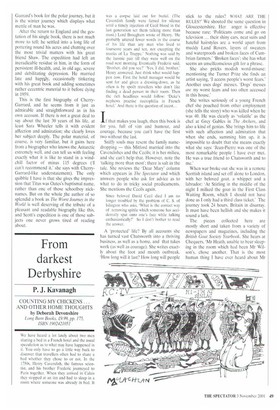A great British failure
Philip Hensher
CHERRY: A LIFE OF APSLEY CHERRY-GARRARD by Sara Wheeler Cape, L17.99, pp. 303, ISBN 0297643339 The three defining myths of the English 20th century are, I suppose, the first day of the battle of the Somme, the empire's 'finest hour', as Churchill called it, after the fall of France, and Scott's journey to the South Pole. It is interesting that two of these are essentially stories of failure, and the third is less of a triumph than a noble renunciation; everyone knew that the cost of standing alone against Nazism would be the loss of the empire. If you add a fourth haunting myth, the sinking of the Titanic, something rather peculiar starts to emerge about the English imagination. It is obsessed with its moments of disaster, and prefers not to dwell on its achievements. The scaling of Everest, for instance, does not dwell in the heart of the English imagination; our myths are all of a noble character revealed in the face of adversity. Without even thinking, I can recall a dozen moments in Scott's doomed expedition; the refusal to eat the dogs; 'Great God this is an awful place.; Oates's exit line; 'It seems a pity'; the discovery of the tent when spring came; and (the moment at which one always breaks down in tears) when the team get back to New Zealand and are told that it has made 'a tremendous impression'.
By contrast, one can't recall anything very much about Hillary climbing Everest, except that the news came on Coronation Day, it was reported by James Morris as was, and that Hillary was accompanied by a sherpa called Tensing. In the long term, for some impenetrable reason, it really hasn't made a tremendous impression. Tales of triumph are impressive, but none, I think, has the mythic resonance which the English routinely attach to noble catastrophes or near-catastrophes like Rorke's Drift or the charge of the Light Brigade. Even Trafalgar only attains the status of national myth due to Nelson's magnificent death. It is all extremely rum.
The Scott expedition exerts, and probably will always exert, a great pull over the English imagination, and it is difficult to think that we would be so moved by it if Scott had beaten Amundsen to the Pole and returned in one piece. It is almost impossible to explain to foreigners why one feels this way, and it is never necessary to explain to an Englishman. I wasted an entire evening recently attempting to explain it to my partner, who is French and would, like Amundsen, eat a dog any day of the week if he was hungry enough. But I don't believe any Englishman ever walks past the statue of Scott which stands opposite the Athenaeum without a moment of silent respect.
The powerful hold the Scott expedition exerts is, in fact, largely down to a single account, Apsley Cherry-Garrard's The Worst Journey in the World. It is often said that most people have a single book in them, but Cherry-Garrard belongs to a small, puzzling category of writers who produced one perfect masterpiece and nothing
else — Choderlos de Laclos, Lampedusa, Emily Brontë. The Worst Journey in the World is a thrillingly vivid, humorous and passionate account of the expedition; its directness, wit and laconic emotional force owe a great deal to the advice and criticism of George Bernard Shaw, Cherry-Garrard's neighbour in the country. It was hugely popular as soon as it was published, and has remained the finest and most moving account of the journey.
Cherry-Garrard wrote it in a spirit of exculpation. Afterwards. he was always tortured by the thought that if he had pressed on a further 11 miles, the polar party would have been rescued. There were certainly those ready to think this at the time, and Cherry-Garrard was much criticised by those who refused to see what an impossible situation he was in — Scott's widow, for the rest of her life, always maintained to anyone who would listen that CherryGarrard had only been taken on the expedition because he was rich. The motive for the book was to set out the confused orders which meant that there was no food for the dogs at the crucial depot. He wanted to counter the increasingly absurd hagiography of Scott himself by fairly setting out his wilfulness, impetuousness — he seriously wanted to go and sock Amundsen on the jaw when he discovered he was in the Antarctic — and the disastrous decisions which led to the death of the whole polar party.
The journey of the title is not, in fact, the journey to the Pole, but the terrifying 'winter journey' which Cherry-Garrard and two companions undertook to gather the eggs of Emperor penguins. It was thought, according to a now discredited biological theory, that the development of foetuses recapitulated the entire evolutionary history of an animal in detail. If the eggs of these miserable birds could he collected and examined, it was thought, a crucial stage in the evolutionary history of reptiles and birds could be reconstructed. The journey was undertaken at dead of winter in the deep polar night, in cold so severe that their teeth shattered and they had to chisel their way into their sleeping bags. Many times they thought they could not survive; at one point their tent blew away — they were extremely lucky to find it nearby, undamaged. To cap it all, when they got back to London and Cherry-Garrard delivered the eggs to the Natural History Museum, he was made to wait in a corridor and dismissed without a word of thanks — a richly funny scene in The Worst Journey in the World. The eggs proved nothing very much, alas. Everyone reads Cherry
Garrard's book for the polar journey, but it is the winter journey which displays what mettle of man he was.
After the return to England and the gestation of his single book, there is not much more to tell; he settled into a long life of pottering round his acres and chatting over the most trivial matters with his great friend Shaw. The expedition had left an ineradicable residue in him, in the form of persistent ill-health, and, in old age, severe and debilitating depression. He married late and happily, occasionally tinkering with his great book and adding sometimes rather eccentric material to it before dying in 1959.
This is the first biography of CherryGarrard, and he seems from it just as admirable and straightforward as in his own account. If there is not a great deal to say about the last 30 years of his life, at least Sara Wheeler tells it with evident affection and admiration: she clearly loves her subject deeply. The polar material, of course, is very familiar, but it gains here from a biographer who knows the Antarctic extremely well, and can tell us with feeling exactly what it is like to stand in a windchill factor of minus 115 degrees (I can't recommend it,' she says with CherryGarrard-like understatement). The only quibble I have is that she gives the impression that Titus was Oates's baptismal name, rather than one of those schoolboy nicknames. But on the whole the author of so splendid a book as The Worst Journey in the World is well deserving of the tribute of a pleasant and readable biography like this, and Scott's expedition is one of those subjects one never grows tired of reading about.
was a corpse laid out for burial. (The Cavendish family were famed for silence until a timely injection of Cecil blood in the last generation set them talking more than most.) Lord Brougham wrote of Henry, He probably uttered fewer words in the course of his life than any man who lived to fourscore years and ten, not excepting the monks of La Trappe.' Nothing was said by the laconic pair till they were well on the road next morning. Eventually Frederic said. 'Brother, did you see?' 'Yes, I did, brother.' Henry answered. Just think what would happen now. First the hotel manager would be sent for and given a dressing-down, as he often is by spoilt travellers who don't like finding a dead person in their room. Then the rich headlines would follow: 'Duke's nephews practise necrophilia in French hotel.' And there is the question of incest...



















































































 Previous page
Previous page